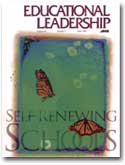Reformers Are Out of Touch
In his “Overview” (February 1995, School Reform: What We've Learned), Ron Brandt wonders what has happened to make reformers so out of touch with ordinary people. I submit that they are not only out of touch with ordinary people but also with most teachers. Although an ASCD member, I do not find my voice in your articles. I have taken many classes and attended numerous seminars taught by so-called “educators,” and have left shaking my head in frustration. “Educators” who teach these classes and seminars make it very clear that they are the experts and that they do not want to listen to us; consequently the voices of the true experts, those who teach, have been stilled.
I challenge all the “educators” who read Educational Leadership to stop treating experienced, talented teachers like semi-literate boneheads whose only objection to their reforms is unwillingness to try something new. Please get in touch with us and stop demeaning us at every turn. On my bad days I could teach circles around most of the “educators,” and so could my colleagues.
—Gail E. Ankerson, History Teacher, Oak Creek High School, Oak Creek, Wisconsin
Why Reforms Are a Hard-Sell
If Ron Brandt doesn't understand why reformers have not been able to sell the general public on school reform, he hasn't been listening. The advocates of school reform have not been honest with the public. Reform programs are invariably started without full disclosure of costs.
Heterogeneous grouping, for example, is promoted for all students despite the fact that the smaller class size needed to handle greater diversity raises costs above what most districts can finance. In addition, heterogeneous grouping deprives some students of much needed academic challenges.
The public has been excluded or has been carefully selected in the debate about most reforms. Such tactics provoke a lack of commitment and outright hostility.
The theme of social and economic equity is what the public finds most repugnant. A social agenda rather than educational positions drives too many reforms. Until reformers can ensure that reforms don't sacrifice one group for the benefit of another, reforms will continue to be a hard sell.
—James R. Collier, Santa Rosa, California
Surveys Obscure the Public's Understanding
Ron Brandt's “Overview” puzzles over the apparent difference between educators' and the general public's attitudes on school reform. One reason for the difference is that surveys such as those conducted by Public Agenda are unable to provide sufficient descriptions of a practice to ensure complete understanding. Respondents often base answers on inadequate knowledge.
For example, the general public usually endorses traditional testing procedures. However, when Shepard and Bliem showed parents both multiple-choice test items and open-ended questions, parents overwhelmingly favored the latter because they “make children think” and “allow teachers to better understand the child's thinking process” (Education Week, October 16, 1994).
As Brandt noted, we need to communicate with all constituencies to build commitment to school reforms. Both educators and the general public need more complete details about practices being proposed.
—Barbara Nelson Pavan, Professor of Education Administration, Temple University, Philadelphia, Pennsylvania
Teachers Can Build Public Support
I agree that extensive reform of public schools is not possible without public understanding and support (“Overview,” February 1995). As a teacher of 30 years, I have found the following practices effective.
Live in the community and share the lives of your students' families. Begin the school year with positive parental contact. Send home class rules and explain evaluation systems. Provide a home phone number. Welcome visitors to class without requiring advanced notice. Provide statements of student progress. Encourage parental involvement in test preparation and writing projects.
Teachers must take the initiative in establishing a positive working relationship with parents before problems arise. Public complaints about out-of-control classrooms are usually based in part on stories parents hear from children. My advice: Communicate first.
—Brant Abrahamson, Brookfield, Illinois
Don't Misjudge Offspring Lyrics
Although Dill and Haberman make crucial points about safety in school (“Building a Gentler School,” February 1995), we want to broaden the understanding of the song they quoted. The neo-punk group, Offspring, is satirizing gang mentality, not glorifying it in “Come Out and Play.”
Taken out of context, the ironic lyrics may seem pro-gang, but the song depicts violence as a “noose” that will destroy gang members. We fear educators may develop misconceptions toward student fans who own an Offspring T-shirt or tape, when in reality, they are tuned into music that celebrates the energy and rationality of today's youth.
—Keith Swaney and Natalie Bair, La Salle University, Philadelphia, Pennsylvania
